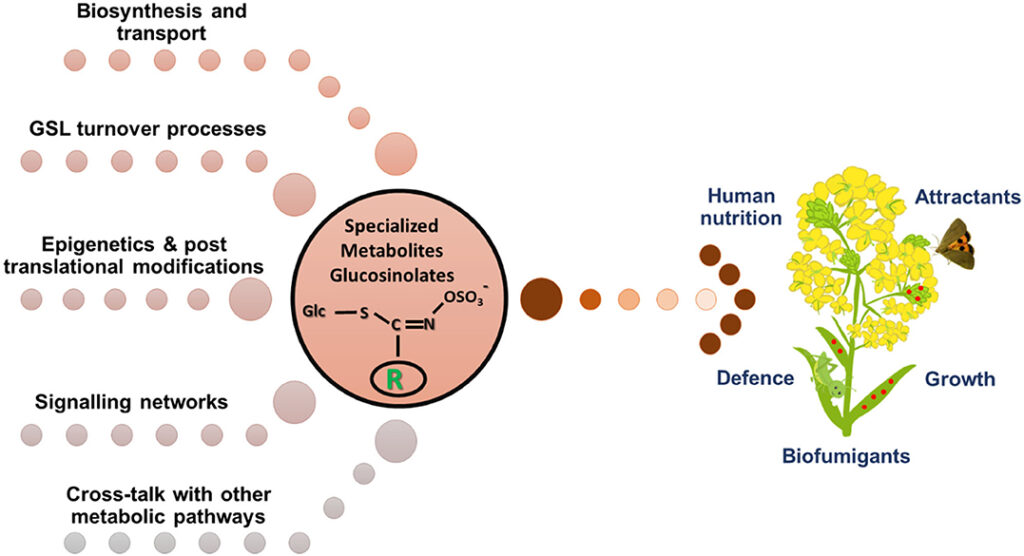
Glucosinolates: Potent Plant Compounds in the Fight Against Human Diseases
In the realm of nutrition and disease prevention, glucosinolates have emerged as powerful allies in the battle against various human diseases. These naturally occurring compounds, found abundantly in cruciferous vegetables, are garnering attention for their potential health-protective properties. Let’s explore the science behind glucosinolates and their promising role in combating human diseases.
What Are Glucosinolates?
Glucosinolates are sulfur-containing compounds primarily found in cruciferous vegetables, including:
- Broccoli
- Brussels sprouts
- Cabbage
- Cauliflower
- Kale
- Radishes
When these vegetables are chopped, chewed, or digested, glucosinolates are broken down into biologically active compounds, such as isothiocyanates and indoles. These breakdown products are believed to be responsible for many of the health benefits associated with consuming cruciferous vegetables.
Glucosinolates and Their Impact on Human Diseases
Research suggests that glucosinolates and their derivatives may play a significant role in preventing and fighting various human diseases. Here’s a closer look at some key areas where glucosinolates show promise:
1. Cancer Prevention and Treatment
Numerous studies have indicated that a diet rich in cruciferous vegetables may lower the risk of certain types of cancer. The anti-cancer properties of glucosinolates are thought to work through several mechanisms:
- Inhibiting the activation of carcinogens
- Stimulating the production of detoxification enzymes
- Promoting apoptosis (programmed cell death) in cancer cells
- Reducing inflammation
For instance, sulforaphane, derived from the glucosinolate glucoraphanin, has shown promising results against breast, prostate, and colon cancer in laboratory studies.
2. Cardiovascular Health
Glucosinolates may contribute to heart health through various mechanisms:
- Reducing inflammation in blood vessels
- Lowering blood pressure
- Improving cholesterol levels
These effects could potentially decrease the risk of heart disease and stroke, though more human studies are needed to confirm these benefits.

3. Neuroprotective Properties
Emerging research suggests that certain glucosinolates may have neuroprotective effects, potentially benefiting conditions such as:
- Alzheimer’s disease
- Parkinson’s disease
- Other neurodegenerative disorders
While human studies in this area are still limited, the initial findings are promising.
4. Anti-inflammatory Effects
Chronic inflammation is linked to numerous health issues, including heart disease, diabetes, and certain types of cancer. Some glucosinolates have demonstrated potent anti-inflammatory properties in laboratory and animal studies, which could have wide-ranging implications for various inflammatory conditions.
Maximizing the Benefits of Glucosinolates in Your Diet
To harness the potential health benefits of glucosinolates, consider these dietary strategies:
- Incorporate a variety of cruciferous vegetables into your meals regularly
- Opt for light cooking methods (steaming, stir-frying) to preserve glucosinolates
- Chop or chew cruciferous vegetables thoroughly to release the active compounds
- Include raw cruciferous vegetables in salads or as snacks
- Consider adding broccoli sprouts to your diet, as they are particularly rich in glucosinolates
The Future of Glucosinolates in Disease Prevention
While the potential health benefits of glucosinolates are exciting, it’s important to note that much of the current research is based on laboratory and animal studies. More human clinical trials are needed to fully understand the effects of glucosinolates on various diseases.
That said, incorporating cruciferous vegetables into your diet is generally considered beneficial for overall health. These vegetables are not only rich in glucosinolates but also provide fiber, vitamins, and other important nutrients.
Conclusion
Glucosinolates represent a fascinating area of nutritional research with potential implications for preventing and fighting various human diseases. While more studies are needed to fully understand their effects, the current evidence suggests that including glucosinolate-rich foods in your diet may contribute to overall health and well-being.
As always, it’s best to consult with a healthcare professional before making significant changes to your diet, especially if you have existing health conditions or are taking medications. Remember, a balanced diet rich in a variety of fruits and vegetables, combined with regular exercise and other healthy lifestyle habits, remains the cornerstone of good health and disease prevention.